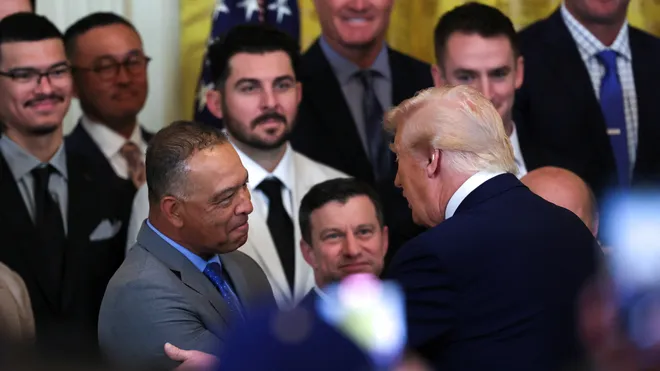
Hernández: Dodgers visiting Trump’s White House goes against everything they represent
The Los Angeles Dodgers’ recent visit to the White House to celebrate their 2024 World Series victory has sparked a significant debate, particularly concerning the team’s relationship with former President Donald Trump. Kiké Hernández, a prominent figure in the Dodgers’ lineup, has voiced strong reservations about this visit, suggesting it contradicts the team’s core values.
Hernández’s Perspective: A Stand Against Adversity
Hernández’s stance is rooted in the Dodgers’ historical commitment to social justice and equality. The team has long positioned itself as more than just a baseball organization; it’s seen as a beacon of cultural progress, largely influenced by the legacy of Jackie Robinson, who broke Major League Baseball’s color barrier in 1947. Hernández argues that aligning with Trump’s administration, known for policies perceived as adverse to minority communities, undermines this legacy. He believes that attending the White House under Trump would be akin to “bending the knee to hateful forces,” a sentiment reflecting the team’s ongoing efforts to champion social change.
Historical Context: Dodgers’ Legacy of Social Advocacy
The Dodgers’ history is intertwined with significant social milestones. Beyond Robinson’s groundbreaking entry into MLB, the team has consistently positioned itself at the forefront of societal progress. For instance, during the 2020 World Series, the Dodgers used their stadium as a mass COVID-19 vaccination site, demonstrating a commitment to public health and community service. citeturn0search10 This tradition of advocacy shapes the expectations of fans and players alike, influencing perceptions of the team’s role in societal issues.
The Political Climate: Tensions with the Trump Administration
The political landscape during Trump’s tenure was marked by actions that many viewed as divisive. From challenging athletes protesting racial injustice to policies perceived as discriminatory, Trump’s presidency often placed sports figures in positions where they had to navigate complex political waters. For the Dodgers, a team with a diverse roster and a history of social advocacy, aligning with an administration associated with policies counter to their values presents a moral quandary. Hernández’s objection to the White House visit is emblematic of this broader tension.
Team Dynamics: Navigating Diverse Opinions
Within the Dodgers’ clubhouse, opinions on the White House visit vary. Mookie Betts, for example, declined a White House visit during Trump’s first term while with the Boston Red Sox, a decision influenced by his personal convictions regarding Trump’s policies. He expressed regret over that choice but emphasized that his decisions are personal and not meant to cause division. citeturn0search0 This diversity of thought highlights the challenges teams face in addressing political engagements, striving to respect individual beliefs while maintaining collective unity.
Public Perception: Fans and Community Reactions
The Dodgers’ decision to visit the White House has elicited mixed reactions from fans and the broader community. Some view the visit as a necessary gesture of respect and tradition, while others feel it compromises the team’s commitment to social justice. The Los Angeles Times editorial board, for instance, suggested that the Dodgers should decline any White House invitation, arguing that associating with Trump contradicts the team’s progressive image. citeturn0search9 This divide underscores the complexities public figures and organizations face when engaging with political institutions, especially in a polarized environment.
Leadership’s Role: Balancing Tradition and Values
Manager Dave Roberts has found himself at the intersection of tradition and progressive values. While he joined the team on the White House visit, he has also been vocal about social issues, supporting player-led protests against racial injustice. Roberts’ leadership exemplifies the balancing act many leaders face: honoring traditions and institutional relationships while advocating for systemic change. His approach reflects an understanding of the multifaceted roles leaders play in both sports and society.
Looking Ahead: Defining the Dodgers’ Legacy
The Dodgers stand at a crossroads, with their actions influencing their legacy both on and off the field. The upcoming seasons will likely see continued discussions about the team’s role in societal issues, their political engagements, and how they reconcile these with their brand and values. For Hernández and others who share his perspective, the focus remains on ensuring that the Dodgers’ legacy aligns with principles of equality, justice, and community empowerment. This ongoing dialogue reflects broader societal conversations about the intersection of sports, politics, and social responsibility.

Leave a Reply